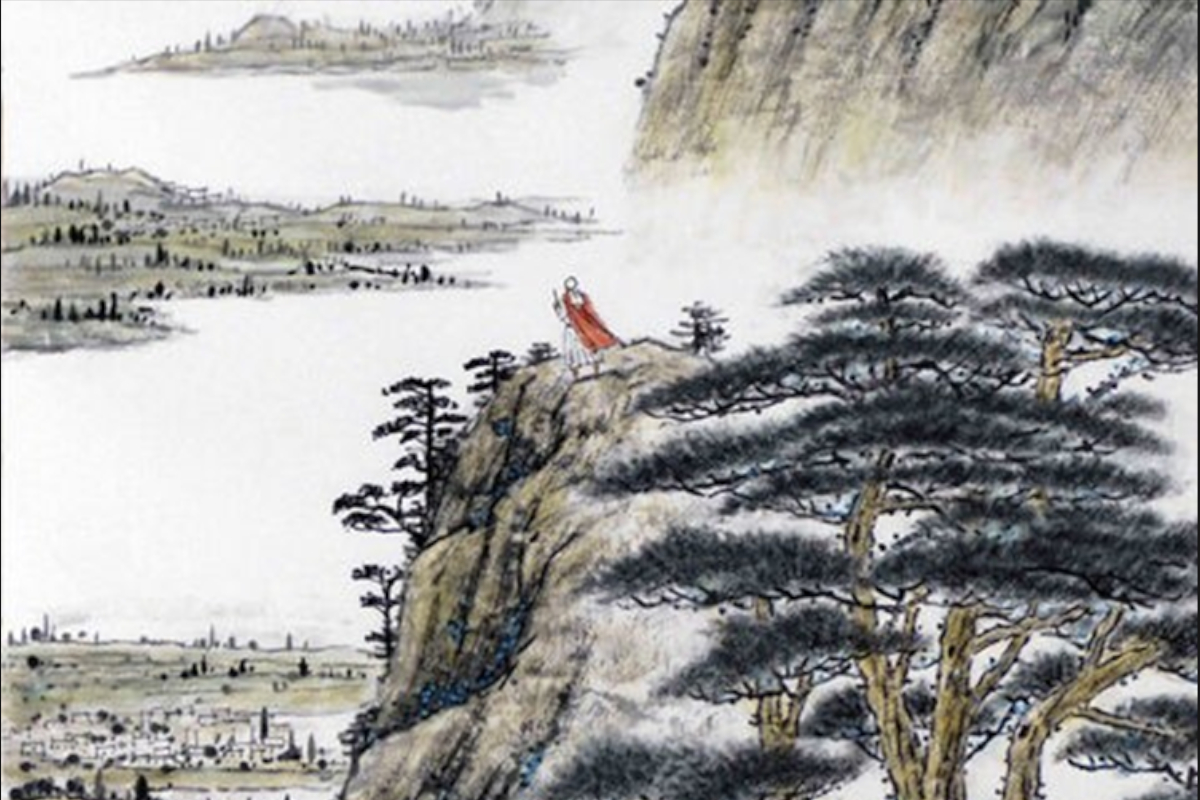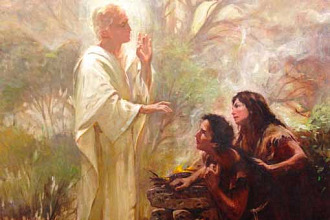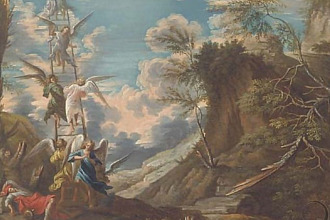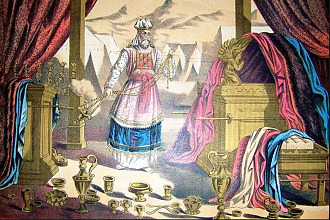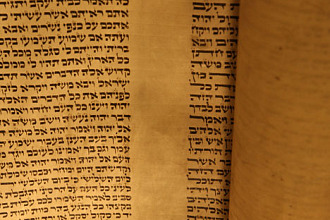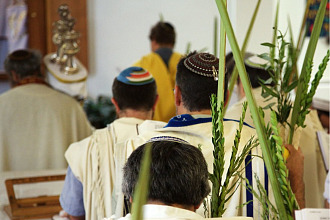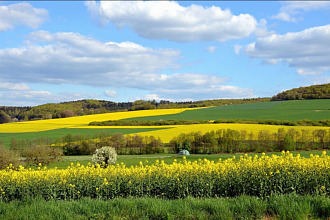Parasha for the Week: Haazinu: Deut:32:1 - 52
Haftarah for the Week: 2 Samuel 22
Apostolic Writings: 1 Corinthians 10:14 - 22
Overview:
Almost all of Ha’azinu is a song or a poem, written in the Torah in two parallel columns. Moshe summons the heavens and the earth to stand as eternal witnesses to what will happen if the Jewish People sin and do not obey the Torah.
Moses reminds the people to examine the history of the world, and note how the Jewish People are rescued from obliteration in each generation—that G-d “pulls the strings” of world events so that Bnei Yisrael (children of Israel) can fulfill their destiny as His messengers in the world.
G-d’s kindness is such that Israel should be eternally grateful, not just for sustaining them in the wilderness, but for bringing them to a land of amazing abundance, and for defeating their enemies. But, this physical bounty leads the people to become self-satisfied and over-indulged.
Physical pleasures corrupt the morals of the people. They worship empty idols and powerless gods, and indulge in all kinds of depravity.
G-d will then let nations with no moral worth subjugate Israel and scatter them across the world. However, their only purpose is as a rod to chastise the Jewish People.
When these nations think that it is through their own power that they have dominated Israel, G-d will remind them that they are no more that a tool to do His will. The purpose of the Jewish People is fundamental — that man should know his Creator.
Neither exile nor suffering can sever the bond between G-d and His people, and eventually in the final redemption this closeness will be restored.
G-d will then turn His anger against the enemies of Israel, as though they were His enemies, showing no mercy to the tormentors of His people.
G-d then gives His last commandment to Moshe: That he should ascend Mount Nebo and be gathered there to his people.
"Song Aazinuh"
This chapter is the appointment of heaven and earth as witnesses and guarantors of G-d’s covenant with Israel and of what will be said regarding Israel’s future.
The word Haazinu has the same root as Ozen (the ear), that is why the parasha starts saying “Give ear, O heavens, and I will speak, and let the earth hear the words of my mouth.” (Deuteronomy 32:1). But Rabbi Hirsch teaches us this word Haazin is to be distinguished from the very well known verb Shama’ which starts the Shema Israel. Haazin means “to incline one’s ear”; the Maazin turns to the speaker in order to listen to his words. The same word exist in Arabic, the Muezzin, the one who call the Muslim to pray and recite the verse of the Koran in the Mosque. By contrast the other word for “listen” Lishmo’a designate the one who can hear but without intention to do so.
That is why Rabbi Hirsch translate this verse as “Incline your ear, O heaven, I would speak, and let the earth hear the words of my mouth.” Heaven and earth are called upon to represent G-d’s covenant, and this representation is carried out primarily by heaven, and only indirectly by the earth. Heaven is active, the earth is essentially passive, because all of the blessing and curse in the physical development of the earth, and in human affairs that depend on that development, results from the cosmic changes that occur outside the earth, and these are included in the concept of Hashamayim (heaven).
That is why Moshe says here Haazinu Hashamayim, the direct request is addressed to Hashamayim, (the heaven); heaven is requested to “incline its ear” in order to take in the words to be said.
By contrast, Moshe says Vetishme’a Haaretz, and not Shema Haaretz: the earth’s hearing is essentially an indirect result of Haazinu Hashamayim.
"Ask Your Father, He Will Tell You"
After describing the qualities of righteousness and straightness of G-d, Moses reminds G-d’s people that if they are corrupted it is not the fault of G-d. “Did it corrupt Him? No! The blemish is His children’s— a generation crooked and twisted.” (Deuteronomy 32:5) The Creator did not corrupted his people, he did not put in them the seed of sins. G-d should not be blamed for the sinful nature of human beings: “Is this how you pay back Adonai, O foolish, unwise people?” (6a). As it was written in the narration of the creation, every creation of G-d were good (Gen 1:4, 10, 12, 18, 21, 25, 31). That is why Moses continues saying: “Isn’t He your Father who ransomed you? He made you and established you.” (6b). G-d did everything for us, he is our father, our creator, he brought us forth, we are his children, he established his people and without his blessings Israel and the church would not exist. That is why the worse thing which could happen is to forget the past and how God has led us individually and as his people: “Remember the days of antiquity, understand the years across generations.” (7a). If we forgot, then individually we can “Ask your father and he will tell you,” (7b) and collectively we can “your elders and they will say to you.” (7c).
HAFTARAH: Hosea 14:2 – 10; Joel 2:15 – 27; Micah 7:18 - 20
On this special Shabbat before Sukkoth (Feast of the Tabernacles) Israel is going to read three texts for the Haftara, not only one. The text of Hosea is a call to come back to the L-rd, we are still in the context of Teshuva (repentance and confession). “Take words with you and return to the L-rd; say to him, “Take away all guilt; accept that which is good, and we will offer the fruit of our lips.” (14:2). Israel has understood that sacrifices of animal are not always pleasing the L-rd. What Hashem wants from us is much more the fruits of our lips that means praises, hallels, and prayers.
The prophet Joel is much more in the context of calling to repentance, with the shofar as it is blown on Rosh Hashana and Yom Kippur. “Blow the shofar in Zion! Sanctify a fast; proclaim an assembly. Gather the people; sanctify the congregation;” (Joel 2:15–16). Israel has just gathered in a solemn assembly for Rosh Hahana and Yom Kippur. However, the prophet says to Israel that is not enough. On Yom Kippur Israel repent and confess their sins, but this coming back to the Lord cannot be only on one day a year, it should be done every day of the year. Then Rosh Hashana and Yom Kippur still have all their significance even though they are already passed.
If Israel is faithful, the Lord will bless her: “ADONAI will answer and say to His people: “Behold, I will send you the grain, the new wine, and the fresh oil, and you will be satisfied with it. I will no longer make you a mockery among the nations.” (Joel 2:19).
The last text from Micah is a recognition from Israel that the L-rd has forgiven her sins. “Who is a G-d like You pardoning iniquity, overlooking transgression, for the remnant of His heritage? He will not retain His anger forever, because He delights in mercy. He will again have compassion on us. He will subdue our iniquities, and You will cast all our sins into the depths of the sea. You will extend truth to Jacob, mercy to Abraham, that You swore to our ancestors from the days of old.” (Micah 7:18–20). What a wonderful G-d who repeats His promises to His people and helps them to start a new year full of confidence in Him.
I love our G-d for His mercy upon His people. It is always a special experience to discover how much G-d loves His people.
APOSTOLIC WRITINGS: 1 Corinthians 10:14 - 22
This text from Rabbi Shaul is inspired by the experience of Israel in the wilderness, that is why in this chapter he affirmed twice that what happened to the people of Israel is to serve as examples for our spiritual life: “Now these things happened as examples for us, so we wouldn’t crave evil things, just as they did” (1Corinthians 10:6), and again in the verse 11 “Now these things happened to them as an example, and it was written down as a warning to us on whom the ends of the ages have come.” That is why Shaul gives four prohibitions to the Corinthians which are derived from God’s severe judgment of the children of God in the wilderness.
Idolatry is forbidden with a reference to Exodus 32:6. 2/ Sexual immorality with for consequence the immediate exclusion from the community (Numbers 25:1-9). 3/ Testing or tempting God with judgment (Numbers 21:5-6). 4/ They were commanded not to grumble (Numbers 14:2) 1Corinthians 10:14-22 is about idolatry. A very common sin in Corinth, city full of pagan temples. People were eating and drinking in the temple of their idols, and this pagan practiced could influence or be confused with the Jewish practice of Kiddush and Motse (blessing with wine and bread). Jews never bless their food, that is a pagan tradition, Jews bless G-d who gives food every day. Just before Yeshua left the earth he gave a new meaning to the cup and the matzot of Pesach, as being a symbol, a remembrance of his body and his blood, but when Yeshua gave this new meaning, it was completely within the tradition of Israel, with no influence from pagan traditions. Yeshua did not bless the wine and matza, he blessed G-d, his father, for giving him this opportunity to live this special night with the disciples.
In this chapter of the letter to the Corinthians, Shaul wants to warn all the believers in Yeshua, not to behave as they behaved before, when they were not yet believers. Let’s remember the experience of Israel in the wilderness worshiping in the Sanctuary and later in the Temple of Jerusalem, they participated in the sacrifice, as we participate in “bread” which represents the body of Mashiach: “The bread which we break—isn’t it a sharing of Messiah’s body? Since there is one bread, we who are many are one body—for we all partake of the one bread. Consider physical Israel. Those who eat the sacrifices—aren’t they partners in the altar?” (1 Corinthians 10:16–18) The danger of sacrificing to the idols and to worship idols always exist, it is a temptation for everyone who is not clear on what he is doing, that was also a danger for Israel : “What am I saying then—that an idol sacrifice is anything, or that an idol is anything? No, I’m saying that what the pagans sacrifice is to demons and not to G-d, and I don’t want you to become partners with demons.” (1 Corinthians 10:19–20), Shaul applies this verse 20 to the pagan sacrifices, but it is a direct quotation of the song Ha’azinu we are reading in the parasha for this week, where Moshe Rabbenu says: “They sacrificed to demons that were no gods, to gods they had never known, to new gods that had come recently, whom your fathers had never dreaded.” (Deuteronomy 32:17), Moshe is speaking here about the people of Israel. This danger existed for Israel during the time of the Hebrew Bible and the covenant of Sinai, and the danger still exist today. Whoever we are, Israel or members of the people of Yeshua, we can fall in the trap of worshiping in pagan ways, which is compared to “offer sacrifice to the demons” (Deuteronomy 32:17). Thus, we have to check carefully what we are doing, in which way we celebrate the Lord Supper. The trans-substantiation —considering that the substance of the bread and the wine is changed in the real body and blood of Yeshua — is a pagan idea introduced in the Lord Supper. The question asked by Rabbi Shaul is the letter to the Corinthians is: “do we drink from the Lord’s cup or the demon’s cup?” He says clearly: “You cannot drink the cup of the Lord and the cup of demons. You cannot partake of the table of the Lord and the table of demons.” (1 Corinthians 10:21). Shaul’s argument here, is that the Corinthians will rouse the L-rd to jealousy. In the verse of Ha’azinu quoted by Shaul it is written: “They sacrificed to demons” Israel was not aware, in the wilderness that they were offering “sacrifices to demons.” The Hebrew word for “demons” Shedim is a very rare word in the Tanach, only twice, here in Deuteronomy 32:17 and in Psalms 106:37 “They even sacrificed their sons and their daughters to demons.” (Psalms 106:37). However, the same root can be found in Psalms 91:6 which is a reference to “waste” and “destruction,” that means to go in the wrong way will lead us to destruction, for the Corinthians everything is permissible, “For in eating, each one goes ahead with his own meal. One goes hungry, another gets drunk.” (1 Corinthians 11:21), but Shaul says no: “What! Do you not have houses to eat and drink in? Or do you despise the church of God and humiliate those who have nothing? What shall I say to you? Shall I commend you in this? No, I will not.” (1 Corinthians 11:22). Thus, in our next participation to the Lord Supper, let’s be sure that we participate in a right way to honor the Lord, and to demonstrate our love to him.

